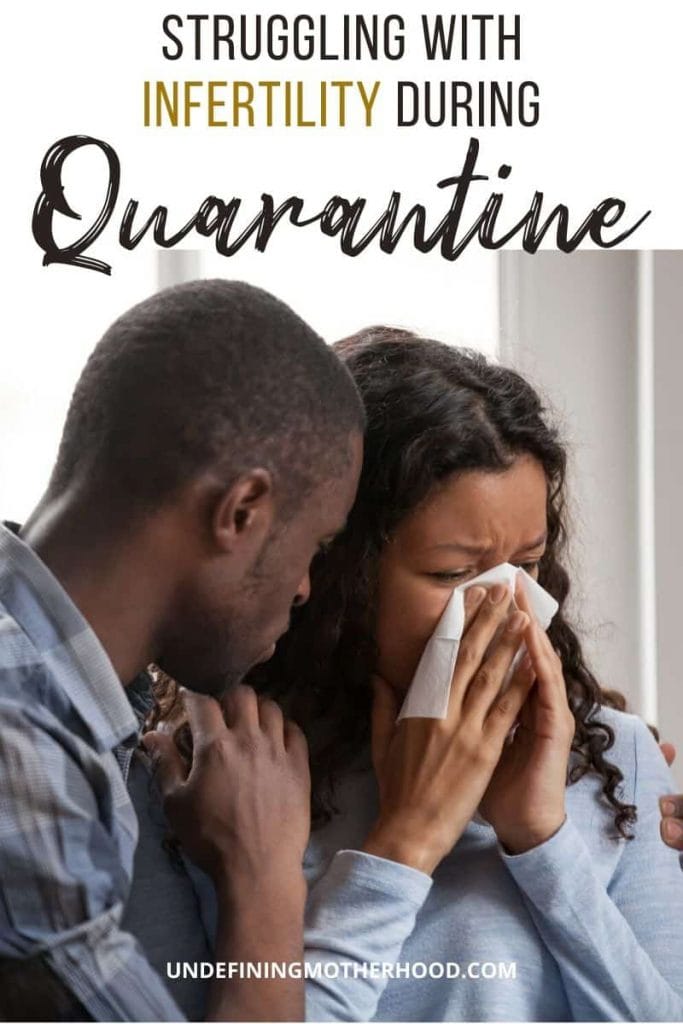Imagine watching everyone around you have a child easily, and not being able to have one yourself. Imagine FINALLY getting pregnant, only to miscarry repeatedly, and then eventually stop conceiving altogether. Imagine that finally, after years of trying, you’re scheduled to receive medical assistance that maybe, just maybe, will help you have the baby you’ve dreamed of. Then imagine the feeling in your gut, your heart, and your mind, when you answer the phone call on the day of that appointment saying that your IVF appointment has been cancelled. Indefinitely. This is infertility during Coronavirus.
This is what so many families struggling through infertility are dealing with right now. After waiting and hormones and tests and probes, they’re experiencing cancelled IVF cycles, fertility appointments, or egg retrievals. This is the devastating byproduct of dealing with infertility during Coronavirus.
This article is written by someone who knows the heartbreak of this experience all too well. Carly lives in Manchester, England with her husband, she’s experienced the heartbreak of dealing with recurrent miscarriage, as well as a recent struggle with infertility.
And thanks to this pandemic, she had her IVF appointment cancelled despite a strong need for egg freezing–sooner rather than later.
Carly’s is a plight so many families are struggling with right now.
Here’s her story and advice for families in the same position.


This site contains affiliate links, meaning that we earn a small commission for purchases made through our site. We only recommend products we personally use, love, or have thoroughly vetted.
Carly’s infertility story
After 2 miscarriages and a failed pregnancy of unknown location, at the age of 40, I found myself unable to get pregnant again.
We underwent testing for reproductive health; test results showed my husband’s sperm had less than 1% normal morphology (shape), so we were given a diagnosis of male factor infertility.
What is male infertility? Learn more in our article about the fertility and infertility definition and experience.
This diagnosis explained our difficulties conceiving, but it came as a huge blow after getting pregnant relatively easily up to that point, despite not being able to carry any of those pregnancies to term.
On the positive side, this meant that we were now eligible for one cycle of IVF with Intracytoplasmic Sperm Injection (ICSI), which would be funded by the UK’s National Health Service (NHS).
(Editorial note: This process looks different for families in different countries.)
The NHS is a publicly funded healthcare system that provides care to UK residents. It is funded by general taxation, and care is generally free at the time of service.
Starting the IVF process
It took us 7 months from referral to being accepted for IVF. In those 7 months, I’d worked to lose weight so my Body Mass Index (BMI) was less than 30. I did this to meet my Clinical Commissioning Group’s funding requirements.
(Note: Clinical Commissioning Groups are part of the UK’s National Health System and are responsible for “planning and commissioning healthcare services for their local area.”)
We’d had baseline testing completed, and had met with our hospital consultant twice.
We were booked in for an information session at our local hospital in mid-March, which would signify the beginning of our IVF process: ovarian stimulation, egg retrieval, embryo creation, implantation, and so much. more.
After months of waiting, starting IVF was a relief
We were excited. And more than that, we were relieved.
Having just turned 41, I knew my chance of having success with IVF was low.
Scientific literature suggested a success rate of around 9% per cycle, but our consultant suggested a slightly better success rate of around 15% per cycle.
Neither figure filled us with confidence. But we knew the success rate would decrease over time, so we were anxious to begin treatment as soon as possible.
The arrival of a pandemic
As we waited for our appointment, the words COVID-19 (also known as the novel Coronavirus) began swirling around us.
Originally reported in Wuhan in China, it was only a matter of weeks before there were cases being reported around the world.
But while this virus was gaining traction and speed in its spread, most of us never imagined the impact it could have on our efforts to try to conceive, or our IVF or fertility treatment journeys.
The UK saw a slow rise in reported cases in the beginning, and the country’s first death from COVID-10 was reported on 5 March. We all hoped it would fizzle out.
However, as time passed and the number of cases quickly multiplied, it became clear this was going to be a long-term situation. Case numbers continued to rise, people lost their lives, and it has already meant significant life changes for all of us.
Everyone began to get nervous. They still are.
Carly’s Cancelled IVF Cycle
In this context of fear and uncertainty, on the morning of our IVF information session, I received a heartbreaking phone call from the hospital.
After new guidance from the UK government on managing the Coronavirus pandemic, all group hospital sessions were being cancelled until further notice.
We understood the importance of slowing down the spread of the virus.
And yet, even half expecting it, this phone call came as a huge disappointment on a personal level.
We now had to prepare for the fact we were facing a cancelled a cancelled cycle and lots of waiting and uncertainty.
Infertility during Coronavirus
Huge numbers of women have taken to social media to keep up-to-date with the advice around fertility treatment and coronavirus.
IVF families are checking with their fertility centers daily. Some clinics are carrying out treatment, others are canceling appointments and IVF cycles.
Most infertility families are also turning to support groups, seeking advice from other women in the same situation.
How does Coronavirus affect women trying to get pregnant?
Advice for pregnant women, or women who are trying to become pregnant, has changed multiple times.
This is, in large part, due to the limited evidence on how the virus behaves, particularly in regard to reproductivity.
The current advice from the American Society for Reproductive Medicine (ASRM) advises fertility clinics to “strongly consider” cancelling embryo transfers and elective procedures, and that consultation should take place virtually, if possible.
The British Fertility Society (BFS) offers similar advice, suggesting that fertility centres work toward suspending all treatments for IVF patients unless the treatment is for urgent medical reasons (such as fertility preservation for patients going through cancer treatments, for example).
The BFS has also advised that pregnant women should class themselves as high risk in relation to COVID-19 and should behave as such. Because pregnancy suppresses the body’s immune response, pregnant women are considered more vulnerable.
It’s worth keeping in mind that whatever decisions a fertility clinic makes – even though it’s incredibly difficult for us, as patients – those decisions have not been taken lightly.
They are based on government and health authority guidance, the availability of healthcare resources and staff, and the best interests of us, the patients.
Our fertility clinics have considered whether deliberately impregnating a woman during a pandemic – and therefore potentially putting both mother and child at risk – is a responsible move both medically and ethically.
While most of us aren’t happy about waiting, I don’t envy the people who had to make that choice for us.
Repercussions of a cancelled IVF cycle
So while our hearts may be broken by a cancelled IVF cycle, we must trust our health professionals. In times like these, we must trust them more than ever.
In the meantime, there are several ways you can take charge of your IVF journey.

Talk to your doctor about cancelling your IVF cycle
It’s possible that you will find the decision of whether or not to go ahead with your IVF cycle put in your hands.
Given the lack of information currently available and the uncertainty about how COVID-19 will develop, it may be useful to ask your doctor the following questions:
- If you cancel your IVF cycle, how long can you expect to wait before treatment will begin again?
- If you decide to postpone your treatment, what payments (if any) will be refundable, and can any payments you’ve already made be carried forward?
- If you go ahead with treatment, what are the chances of the cycle being cancelled part-way through?
- If your IVF is successful, what measures will be put in place to reduce risks associated with pregnancy and COVID-19?
The waiting
For me, the hardest part of our IVF cycle being postponed has been the added worry of losing time, which is so precious when I am already nearing the end of my naturally fertile period.
The takeaway message from our most recent appointment was that, because of my age, the consultant wants to “get the eggs out of me as soon as possible.”
Now we’re in a situation where, after waiting for many months already, we’re being told we must wait some more.
What’s worse is that we don’t know how long “some more” is. 3 months? 6 months? A year?
In such uncertain times, nobody can answer that question, which makes it all the more difficult to come to terms with having to postpone our IVF plans.
In a process that is already incredibly slow and protracted, added delays bring with them huge emotional stress, worry, and a real sense of being in limbo.
We are desperate for a child and unable to get pregnant, but we have no resolution either way.
And in the meantime, my eggs continue to age.
How to cope with a cancelled IVF cycle
If you find yourself having your IVF appointment cancelled, it’s easy to fall into despondency. But I am consciously looking for positive aspects to the situation, and surprisingly, I think there are some.
Instead of focusing on losing time through waiting, I am trying to view it as gaining time instead.
I now have a longer period to prepare my body, mentally and physically, for the IVF to come.
I intend to:
- Find out about supplements that could benefit my body, helping it to prepare for pregnancy. Ubiquinol (or CoQ10) for egg quality, vitamin E for endometrial lining, a prenatal vitamin with methylated folate. These are all things I can take now so I’m ready when my IVF cycle starts up again. You can learn more about using supplements to support fertility in It Starts with the Egg by Rebecca Fett.
- Lose some more weight. Although we hear this way too much as women, there is a correlation between weight and fertility. I am now within acceptable limits for IVF, but I plan to continue losing weight, aiming for the “ideal” BMI range.
- Get fit. Although there may be restricted access to gyms during the spread of the virus, I intend to get out walking as much as possible and will also do regular home-gym workouts. Undefining Motherhood loves this 6-week, at-home program by Karen at Well Balanced Women!
- Practice meditation. I react strongly to stressors and this is one almighty stressor. So I will use techniques like meditation to try and calm myself, maintaining some equilibrium while everything around me feels like it’s going crazy. Undefining Motherhood recommends the Calm app, with guided meditation and resources to help you improve your sleep.
- Use social media sometimes, but not all the time. I rely on social media a lot for support around infertility, and I will be relying on this more than ever while we’re dealing with social distancing. But I am trying to remember that too much social media can be unhealthy, so I’ll be restricting myself to what I feel is a balanced level for me. Use your support groups, but avoid anything anxiety-provoking or that could be considered fear mongering.
Emotions when dealing with infertility during coronavirus
You may find the emotions you experience due to a cancelled or postponed IVF cycle surprising, and perhaps overwhelming.
Initially, all I felt was panic, worrying that by the time the pandemic resolves, it will be too late for me to proceed.
But then I noticed other emotions creeping in.
There is definitely some anger. I’ve found myself asking:
- Who has the right to decide whether my treatment goes ahead or not?
- Why should my treatment be delayed when other peoples’ treatments are going ahead?
- Do I have the right to appeal and if not, why not?
Objectively, I know that healthcare systems worldwide are struggling to cope with the demands being made on them and that, right now, saving lives is way more important than creating new ones.
But it’s difficult to reason with anger, so I’m trying to give myself a break for feeling this way.
I’ve also experienced relief.
Delaying treatment means delaying the gruelling schedule of an IVF cycle – the multiple daily injections, hormone-induced mood swings, frequent monitoring scans and blood tests and the surgical procedure.
Although I want the end result of IVF, the process itself I’m not looking forward to. So a delay means I get to enjoy feeling well for longer.
It also means I get to postpone knowing what the final result of my IVF cycle will be.
And for as long as that one cycle hasn’t happened, I still have the hope that it will work and that we will end up taking home our baby.
Are you dealing with a cancelled IVF cycle during the Coronavirus outbreak? Let us know how you’re coping!
More articles to cope with the pandemic
- 10 natural ways to boost your immune system
- 3 tips for dealing with uncertainty about the future
- Managing birth disappointment & giving birth alone at hospital
- Preschool and toddler activities at home (indoor & outdoor)
- Stay at home kid activities for elementary-aged children










